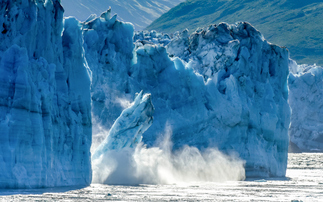Socialist country sets out 10 point plan in UN submission, including making water a human right
Bolivia has called for an end to capitalism in order to tackle climate change, warning the economic system is leading humanity towards "a horizon of destruction that sentences nature and life itself to death".
The socialist country yesterday submitted its national climate action plan to the United Nations, which all nations have been asked to prepare ahead of global talks in Paris that begin next month.
Bolivia steered away from setting an economy-wide carbon reduction goal and instead pledged to end illegal deforestation within the next five years and boost the share of renewable energy to 79 per cent by 2030 up from 39 per cent in 2010.
See what countries have pledged in our interactive map
The plan, known in UN jargon as an Intended Nationally Determined Contribution (INDC), blamed the "failed" capitalist system as the trigger for climate change.
"The capitalist system promotes consumerism, warmongering and commercialism, causing the destruction of Mother Earth and humanity," it stated. "The capitalist system is a system of death. Hence, capitalism is leading humanity towards a horizon of destruction that sentences nature and life itself to death. In this regard, for a lasting solution to the climate crisis we must destroy capitalism."
The document also set out "10 structural solutions to the climate crisis", which included establishing a global environment court, eliminating technology patents and diverting military resources to climate finance.
Speaking at a conference on Monday, Bolivian President Evo Morales urged industrialised nations to reduce emissions. "Don't go against the natural world, natural law, go with Mother Earth," Al Jazeera reported him saying. "She has a certain way of doing things and when you start going against that there are no penalties or fines, there's only consequences when you go against natural law."
However, Bolivia has been accused of hypocrisy for its aggressive stance against capitalism, while petroleum gas continues to account for nearly half of its exports, with a further four per cent coming from crude oil. The INDC also fails to commit to ending legal deforestation, which has allowed the country to expand its soybean plantations.
Bolivia's ten structural solutions to the climate crisis:
1. Adoption of a new model of civilisation in the world without consumerism, war-mongering, and mercantilism, a world without capitalism; build and consolidate a world order of Living Well that defends and promotes the integral rights of our peoples, undertaking the path of harmony with nature and respect for life.
2. Construction of a climate system based on responsibility to Mother Earth, the culture of life and the full realization of humanity in their holistic development, humanising the economy, surpassing the simplistic approach to decarbonisation of the economy.
3. Protection of the Rights of Mother Earth in an articulated and complementary manner to the rights of peoples to their development.
4. Defense of universal common goods such as the seas and oceans, water, atmospheric space, as well as the technological monopoly, promoting people's access to the common heritage.
5. Elimination of patents on technologies and recognition of the human right to science and technology of life.
6. Effective implementation by governments of the human right to water.
7. Establishment of the International Court of Justice Climate and Mother Earth to enable countries to fulfill their international commitments to climate change in a context of respect for the rights of peoples and of Mother Earth.
8. Allocate the resources of the military machinery of the imperial powers and the war-mongers to finance the activities of the peoples against climate change.
9. Eradication of commodification of nature and carbon markets promoting business climate millionaires, which do not solve the problem of the climate crisis.
10. Decolonize natural resources environmental colonial biased views that see the peoples of the South as forest rangers of Northern countries and communities as enemies of nature.
This article is part of BusinessGreen's Road to Paris hub, hosted in association with PwC










